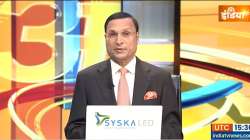OPINION | G20 summit: Modi's vision
Modi realized the importance of G-20, coordinated with its member countries and strove to make it the world's biggest forum.

The G20 summit got off to a dazzling start on Saturday at the newly built Bharat Mandapam Convention Centre in Delhi, with Prime Minister Narendra Modi presiding. African Union was added as a new member of the group. But the talking point was about the placard displaying the name 'Bharat' instead of 'India' when Modi addressed the August gathering. The G20 summit has been held previously in 18 countries, but this is being held in India for the first time, on a scale so huge, that no other host country could do it. Some may raise questions about the benefits that would accrue to Bharat. They should understand that if Bharat wants to be a global leader, G-20 is the route. This group consists of countries that command a total of 80 per cent of world GDP, have a 75 pc share of international trade, and comprise more than two-thirds of the world population.
G-20 covers 60 per cent of the world's geographical area. Consider the big scale of this platform. Modi realized the importance of G-20, coordinated with its member countries and strove to make it the world's biggest forum. G20 summits used to be held earlier in many countries, leaders used to deliver speeches, and resolutions used to be passed before the summits ended, but Modi tried to link it with the people. Popular participation was encouraged. G20 held nearly 200 meetings in 60 cities and towns of India. All the states and union territories arranged nearly 300 cultural programs involving 18,000 artists for the world to see. More than a lakh delegates took part in those meetings.
Nearly 1.5 crore Indians were part of these programmes in one way or the other. Instead of continuing with the tradition of holding only a summit of heads of states, he made it a public-to-public contact platform for member countries. There lies the significance. It is surely going to give a boost to business, tourism, employment and trade. The theme 'One Earth, One Family, One Future' outlined by Modi will help achieve its aims. Even former Prime Minister Dr Manmohan Singh praised the G20 summit on Friday. He said, "I am very glad that India's rotational chance for the Presidency of the G20 came during my lifetime and I am witness to India hosting world leaders for the G20 summit...I am more optimistic about India's future than worried."
Dr Manmohan Singh is regarded as the most experienced and veteran leader of Congress and his words carry meaning. But Congress leader Rahul Gandhi is not happy. He was in Brussels, Belgium on Friday, where, while addressing a press conference, he levelled several allegations against the Modi government and repeated that democracy was in danger in India. He even praised China's manufacturing model by becoming a world production center, but added that India should explore an alternative democracy-based model.
Rahul said, India's government has no proper future vision, but if anybody questions Rahul about his vision and thoughts, he may take it amiss. Was it proper to make such remarks at a time when the world's attention was focused on G20 summit in India? Was it proper for the leader of India's biggest opposition party to sit in Europe and point out weaknesses? This cannot be a coincidence. It was a well-thought-out exercise. Was this strategy right and in the national interest? Rahul Gandhi will neither think about it nor try to understand it. At least senior Congress leaders should think.
Aaj Ki Baat: Monday to Friday, 9:00 pm
India's Number One and most followed Super Prime Time News Show 'Aaj Ki Baat- Rajat Sharma Ke Saath' was launched just before the 2014 General Elections. Since its inception, the show has redefining India's super-prime time and is numerically far ahead of its contemporaries.